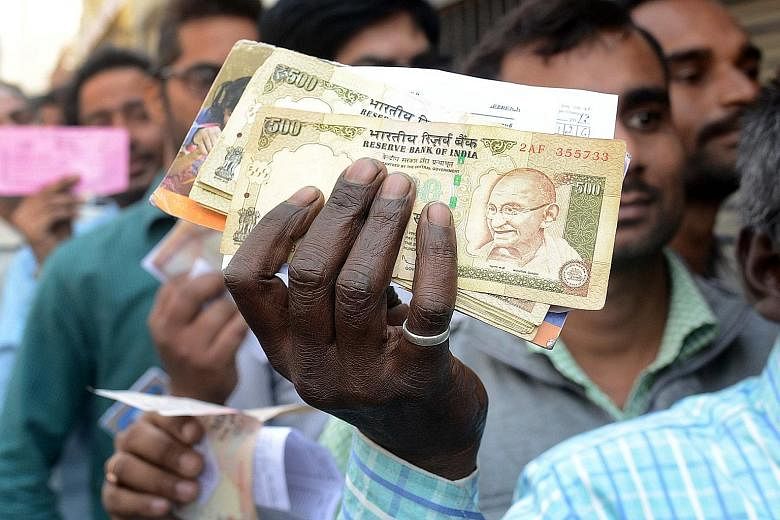Prime Minister Narendra Modi is facing political and economic challenges heading into the new year as he seeks to ease a crippling cash crisis while preparing for state polls, including in his home state of Gujarat.
Mr Modi came to power in 2014 in a landslide victory, promising bold steps to boost economic growth and employment and root out corruption.
His boldest steps came this year, midway through his five-year term.
In August, he received parliamentary approval for the Goods and Services Tax legislation, convincing a hostile opposition to support it.
In November, he announced demonetisation of 500- and 1,000-rupee banknotes, a move that some have called his biggest gamble yet and perhaps his riskiest because of the chaos it has caused. The Indian economy is heavily reliant on cash for most transactions and removing the high-value notes meant 86 per cent of banknotes were taken out of circulation. They are slowly being replaced with new notes.
Demonetisation, announced on Nov 8, aims to bring billions of dollars' worth of unaccounted wealth into the mainstream economy and curb terror financing, which used counterfeit 500- and 1,000-rupee notes. Yet the step has caused deep frustration, with long queues outside banks.
Analysts said Mr Modi needs to keep the Indian economy, the fastest-growing in the world, on track in the new year amid some predictions that demonetisation could shave at least 2 per cent off growth.
"He has to quickly ensure the economy jumps to 7 1/2 to 8 per cent growth and inspire enough confidence in the economy that the private sector starts investing in manufacturing. Government spending on infrastructure needs to take off and, third, he has to give incentives to kickstart the rural economy consumption," said Mr Rishi Sahai, managing director of investment bank Cogence Advisors.
The implementation of the Goods and Services Tax, which is set to miss its original April 1 deadline, is also key to Mr Modi's agenda to attract investment and push economic growth.
The unified tax will do away with a labyrinth of state and federal taxes and is expected to boost manufacturing and improve revenue through more efficient tax collection.
But to be implemented, the government still needs to push through enabling legislation, including a Bill to compensate states for any loss of revenue.
For Mr Modi, sorting out his economic agenda is also closely tied to his party's political fortunes, with a clutch of states headed for elections next year.
The first half of the year will see polls in the states of Uttar Pradesh, Punjab, Goa, Uttarakhand and Manipur, and in the latter half, in Himachal Pradesh and Gujarat.
The ruling Bharatiya Janata Party (BJP) is looking to retain power in Gujarat, where Mr Modi ruled for 13 years, and score a win in Uttar Pradesh, a politically important state with 80 MPs, the highest representation in Parliament of any state. Victory would increase the BJP's political strength.
"Uttar Pradesh elections will be an important marker of demonetisation, which has affected everybody. Right now no one knows what the impact will be," said Professor Bidyut Chakrabarty, a political science professor at Delhi University.
The elections will also be determined by local issues, such as law and order, as well as caste and religious calculations.
"Local issues will be important but somewhere it (demonetisation) will have an impact," said Dr Aftab Alam, associate professor of political science at Aligarh Muslim University.
There are uncertainties, too, in foreign policy, an area many see as the highlight of Mr Modi's tenure so far.
Mr Modi has visited more than three dozen countries since coming to power and infused fresh energy into India's diplomatic outreach.
Still, the new year will test India's ties with the US, which have been growing closer, under a Trump presidency, said analysts.
Ties with China and Pakistan are under strain, with India trying to put pressure on Pakistan to act against militants following terror attacks on Indian military targets. A surgical strike by India on terror targets near the border enthused Mr Modi's supporters, but has not yielded any diplomatic gains.
Critics fault Mr Modi's Pakistan policy in particular. "Mr Modi has not been able to handle Pakistan effectively... He promised bold steps but he is also hemmed in by the international community," said Dr Alam.
"All round, there is no doubt it will be a difficult year for Modi."

